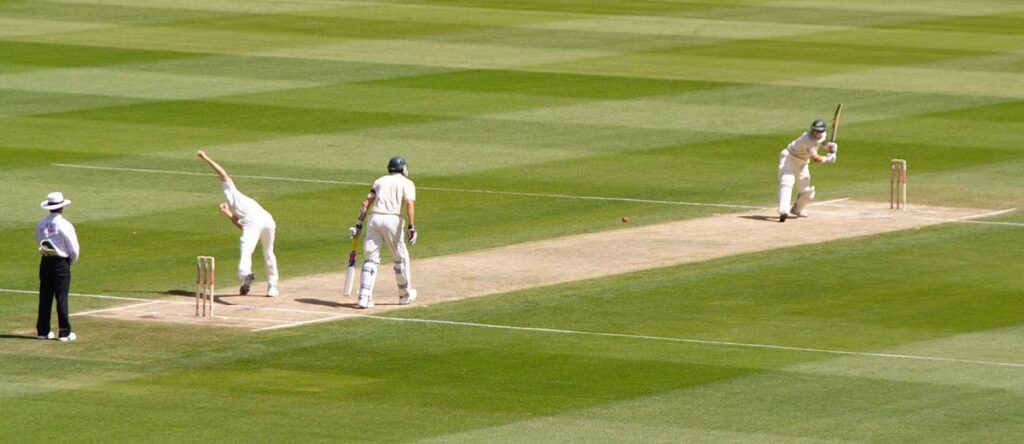Rizwan, Shakeel tons define Pakistan’s day of gains
Written by FM 100 on August 23, 2024
A 240-run fifth-wicket stand between Saud Shakeel and Mohammad Rizwan formed the centerpiece of a dominant second day for Pakistan as they declared at 448 for 6, leaving Bangladesh to see off a tricky hour or so before stumps. Bangladesh did so, with openers Shadman Islam and Zakir Hasan surviving 12 overs, but they will have to come back and face Pakistan’s four-pronged seam attack on day three with a ball that is still relatively new.
Pakistan looked to up their scoring rate when they resumed after tea, with Rizwan announcing their intent by stepping out and clouting Shoriful Islam for a big six over long-on. The shot triggered a bout of cramps, and Rizwan continued to hobble as he collected 37 off 42 balls after tea to finish unbeaten on 171 when Pakistan declared.
Pakistan’s aggressive intent after tea cost them one wicket, when Shakib Al Hasan’s guile undid Agha Salman’s attempt to hit him against the turn, bringing about a sliced catch at backward point. But it also brought quick runs, as Shaheen Shah Afridi slogged two sixes on his way to an unbeaten 29 off 24.
Rizwan came out and kept wickets when Bangladesh’s innings began, but cramps forced him to leave the field after 7.3 overs, with Sarfaraz Ahmed taking over behind the stumps. In all, Rizwan was on the field for all but 4.3 overs of the day’s play.
Having added 44 on day one, Shakeel and Rizwan batted on for the best part of two sessions before Bangladesh finally broke their stand, with just over 15 minutes to go for tea.
The visitors’ long-awaited moment of inspiration came from Mehidy Hasan Miraz, who dangled up a teasing offbreak that dragged Shakeel onto the front foot to defend, then dipped and turned sharply past his outside edge, leaving him reaching for the ball and dragging his back foot out of the crease. Litton Das completed the dismissal with lightning glovework after collecting the ball somewhere around the seventh-stump line.
This was a dismissal with a margin of millimeters; the tip of Shakeel’s toe was on the crease when the bails began to flash.
There had been only millimeters in it an over earlier, too, when Shakeel – who had routinely left his crease against the fast bowlers to negotiate movement – shouldered arms to Hasan Mahmud and Litton, alert to the possibility, threw down the stumps. Then, Shakeel had plonked his bat into the crease and landed a fraction of a second – a fraction too small for the frame rate of the TV cameras to capture definite proof – before the bails lit up.
Litton had been involved in most of the small sprinkling of nervous moments that Shakeel and Rizwan endured during their 63.5 overs together. He had moved alertly to his left to create a diving opportunity when Rizwan lobbed up a bat-pad half-chance off Mehidy, but hadn’t been able to finish the job. He had missed an even tougher chance, down the leg side, off Rizwan’s glove when he had tried to sweep Shakib.
That these moments were so infrequent, and so far from being genuine chances, reflected how well Shakeel and Rizwan batted as they brought up their respective third Test hundreds. It also reflected how much the conditions had eased up since the start of the Test match, when Bangladesh had made full use of the new ball and early moisture to reduce Pakistan to 16 for 3.
Proof of the transformed conditions – though the tiredness in the Bangladesh seamers’ limbs also contributed, no doubt – came when Bangladesh took the second new ball, ten overs after lunch. Both batters had brought up their centuries by then – Rizwan going from 91 to 97 by stepping out and launching Shakib for a big six over wide long-on, then whipping him over midwicket for four to reach three figures – and they greeted the return of the fast bowlers with a series of gorgeous strokes.
Rizwan eased Hasan Mahmud through cover point in the 82nd over, and in the next over Shakeel stood tall to drive Shoriful on the up through cover.
The batters embraced when Shakeel played that shot, perhaps recognising the fact that it was his first boundary of the day, and his unhurried, unbothered manner while going through 123 balls without one.
Shakeel made up for that in the overs that followed, pulling Shoriful and Nahid Rana disdainfully when they tried to bounce him, and whipping Rana off his hips when he veered too straight.
Rana had tried the short-ball ploy in the first session too, and occasionally made both batters look awkward. But it came at a cost: his five overs in the morning went for 32 runs.
Rizwan scored most of those runs, including back-to-back falling ramps over the slips off bouncers angling into his body to go from 46 to 54. In Rana’s next over, he showed more of his range against the short ball, hooking him for a six over backward square leg.
Rizwan was by far the quicker scorer of the fifth-wicket pair during the first session, adding 65 off 100 balls. Shakeel had less of the strike, and made quieter use of it, scoring 32 off 77 without adding to his five boundaries from day one. By lunch, Rizwan had overtaken Shakeel having started the day 33 runs behind.
Their methods may have been different, but their effect on Bangladesh was similarly dispiriting. Shakeel’s defence, in particular, looked unbreachable at times; he was beautifully balanced at all times, and invariably met the ball right under his eyes with the bat’s full face.
As the day went on, Bangladesh’s spinners began to take on a greater share of the workload, and both Shakib and Mehidy put a difficult first day – they had gone for a combined 36 from their six overs – behind them and performed an admirable holding job. Much of their day-one despair had been related to Pakistan’s clinical use of the sweep. They responded by attacking the stumps far more, and bowling a touch quicker than they had earlier, with protection in the deep square on the leg side. Both used drift cleverly, and Mehidy on occasion extracted sharp turn too.




